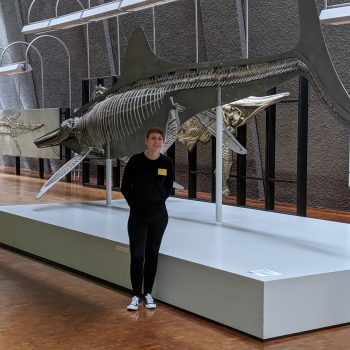Jamie Dolling
- University of Birmingham
- Promoting wildtype behavioural ecology in sanctuary great apes to aid reintroduction programmes
- Dr Susannah Thorpe & Dr Jackie Chappell
Wild populations of great apes are becoming increasingly threatened at an alarming rate. A key aim for great ape sanctuaries is to reintroduce their animals back into the wild, in order to reinforce existing populations. For reintroduction to be successful, the apes must be behaviourally and physiologically fit to survive in the wild. This project builds upon previous NERC-funded research, where an Enclosure Design Tool (EDT) was designed to elicit wildtype behaviour in zoo-housed great apes. The aim of this project is to design EDTs specific to sanctuary great apes in range countries. Through quantifying how behaviours in sanctuary great apes develop differently from wild conspecifics over their life course, the aim is to make species-specific enclosure modifications to encourage the development of natural behaviours. Success in modifying behaviour will be evaluated through studying behaviour pre- and post-enclosure modification. The aim is for these EDTs to enhance the success of great ape conservation and reintroduction programmes.
I moved from the Netherlands to the UK to study BSc (Hons) SW Zoo Biology at Nottingham Trent University. In my placement year, I volunteered at the Dao Tien Endangered Primate Species Centre in Cat Tien National Park, Vietnam. I studied the behaviour of rescued golden-cheeked gibbons undergoing rehabilitation as part of a reintroduction project. I went on to study MSc Global Wildlife Health and Conservation at the University of Bristol. My research project focused on the measurement of behaviour, spatial use and potential environmental stressors in a new gibbon enclosure at Twycross Zoo. Before starting my PhD project, I worked as an education officer at Twycross Zoo.
I really enjoy the process and challenge of conducting research and I believe that research is essential in order to achieve conservation impact. Therefore, I liked the idea of undertaking a PhD, but in order to reach the decision of starting a 4-year personal and financial commitment like it, I felt that its topic would have to align perfectly with my aspirations and interests. When this project was advertised, I could not have been more excited.
After reading the CENTA website and talking to students already on the studentship, I realised that there is so much more to this studentship than financial security. I really liked the idea that CENTA provides you with training, as it allows you to get the most out of your project and build upon a variety of skills. It’s a bit like having a support system, as they invest in the development of your abilities.
I think that studying at CENTA/University of Birmingham will provide me with the opportunity to work with and learn from people who work in similar fields and share similar interests, and build greatly upon my knowledge and skills as a communicator and researcher. I think and hope that this experience will help me to keep working and growing within the field of conservation research.




